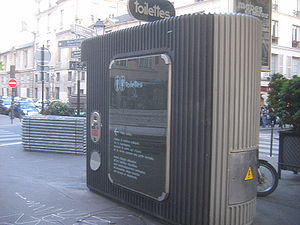
Committee to End Pay Toilets in America
Encyclopedia

Pay toilet
A pay toilet is a public toilet that requires money payment of any individual to use. It may be street furniture or be inside a building, e.g. a mall, department store, railway station, restaurant, etc. The reason for charging money for using toilets usually is for the maintenance of the...
s in many American cities and states.
History
Founded in 1970 by then-nineteen year old Ira Gessel, the Committee's purpose was to "eliminate pay toilets in the U.S. through legislation and public pressure."Franckling, Kenneth (21 Aug 1974). Ban on pay toilets disputed, The Dispatch (Lexington)The Dispatch (Lexington)
The Dispatch is an American daily newspaper published in Lexington, North Carolina, by the New York Times Regional Media Group. The newspaper is published Monday through Saturday with no Sunday edition. Billing itself as "Davidson County's News Source", The Dispatch began publication in 1902...
, Retrieved October 19, 2010Geringer, Dan (2 May 1972) A New Kind of Protest, The Palm Beach Post
The Palm Beach Post
The Palm Beach Post is a major daily newspaper in Florida, serving Palm Beach County in South Florida, and the Treasure Coast area. It is the 72nd largest daily newspaper in the United States and the sixth largest in Florida.-History:...
, Retrieved October 19, 2010
Starting a national crusade to cast away coin-operated commodes, Gessel told newsmen, "You can have a fifty-dollar bill, but if you don't have a dime, that metal box is between you and relief." Membership in the organization cost only $0.25, and members received the Committee's newsletter, the Free Toilet Paper. Headquartered in Dayton
Dayton
Dayton is a city in Ohio and the county seat of Montgomery County, Ohio, United States.Dayton may also refer to:-United States:*Dayton, Alabama*Dayton, California, in Butte County*Dayton, Lassen County, California*Dayton, Idaho*Dayton, Indiana...
, Ohio
Ohio
Ohio is a Midwestern state in the United States. The 34th largest state by area in the U.S.,it is the 7th‑most populous with over 11.5 million residents, containing several major American cities and seven metropolitan areas with populations of 500,000 or more.The state's capital is Columbus...
, USA, the group had as many as 1,500 members, in seven chapters.
The group also sponsored the Thomas Crapper
Thomas Crapper
Thomas Crapper was a plumber who founded Thomas Crapper & Co. in London. Contrary to widespread misconceptions, Crapper did not invent the flush toilet. He did, however, do much to increase the popularity of the toilet, and developed some important related inventions, such as the ballcock...
Memorial Award, which was given to "the person who has made an outstanding contribution to the cause of CEPTIA and free toilets."
In 1973, Chicago
Chicago
Chicago is the largest city in the US state of Illinois. With nearly 2.7 million residents, it is the most populous city in the Midwestern United States and the third most populous in the US, after New York City and Los Angeles...
became the first American city to act when the city council
City council
A city council or town council is the legislative body that governs a city, town, municipality or local government area.-Australia & NZ:Because of the differences in legislation between the States, the exact definition of a City Council varies...
voted 37–8 in support of a ban on pay toilets in that city. According to a book by Bruce Felton and Mark Fowler, this was "... a direct response, evidently," to CEPTIA.Wiggins, Ron (2 August 1973) Comfort-For-Pay Being Flushed Out, Evening Independent, Retrieved October 19, 2010
According to the Wall Street Journal, there were, in 1974, at least 50,000 pay toilets in America, mostly made by the Nik-O-Lok Company. Despite this flourishing commerce, CEPTIA was successful over the next few years in obtaining bans in New York
New York
New York is a state in the Northeastern region of the United States. It is the nation's third most populous state. New York is bordered by New Jersey and Pennsylvania to the south, and by Connecticut, Massachusetts and Vermont to the east...
, New Jersey
New Jersey
New Jersey is a state in the Northeastern and Middle Atlantic regions of the United States. , its population was 8,791,894. It is bordered on the north and east by the state of New York, on the southeast and south by the Atlantic Ocean, on the west by Pennsylvania and on the southwest by Delaware...
, Minnesota
Minnesota
Minnesota is a U.S. state located in the Midwestern United States. The twelfth largest state of the U.S., it is the twenty-first most populous, with 5.3 million residents. Minnesota was carved out of the eastern half of the Minnesota Territory and admitted to the Union as the thirty-second state...
, California
California
California is a state located on the West Coast of the United States. It is by far the most populous U.S. state, and the third-largest by land area...
, Florida
Florida
Florida is a state in the southeastern United States, located on the nation's Atlantic and Gulf coasts. It is bordered to the west by the Gulf of Mexico, to the north by Alabama and Georgia and to the east by the Atlantic Ocean. With a population of 18,801,310 as measured by the 2010 census, it...
, and Ohio. Lobbying was so successful that by June 1976, twelve states had enacted bans and the group announced that it was disbanding, declaring its mission mostly achieved. By the decade's end, pay toilets were almost unknown in America.
Further reading
- Ralph Slovenko, "On Answering The Call Of Nature", 24 Wayne L. Rev. 1555 (1978).

